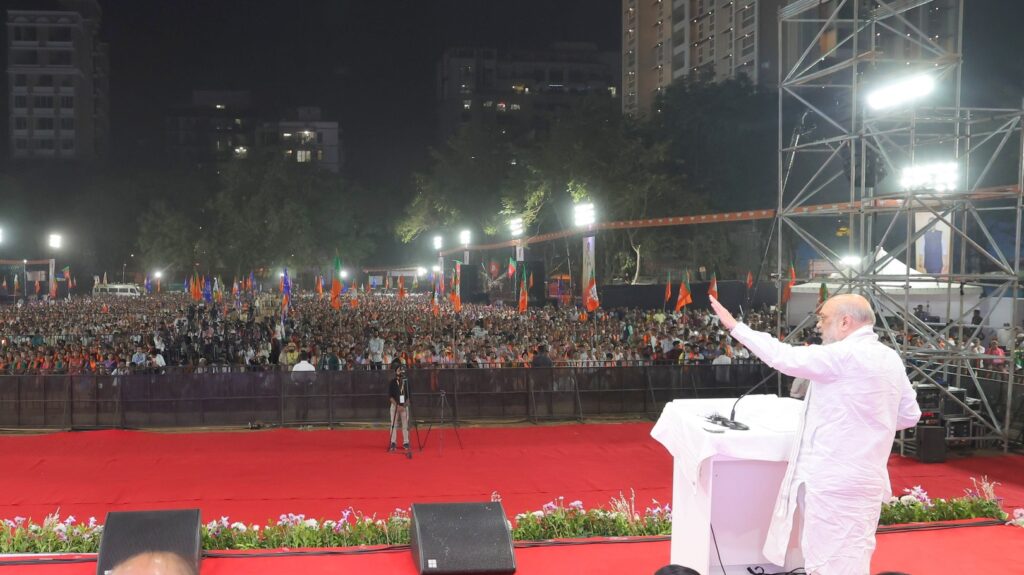The Maharashtra state elections, set to take place on November 20, 2024, have been marked by rampant anti-Muslim hate speeches during the ongoing campaign. One of the most controversial elements of the rhetoric has been the popularization of Uttar Pradesh Chief Minister Yogi Adityanath’s slogan, “batoge toh katoge,” which translates to “if divided, you will be slaughtered.” He first delivered this slogan in August during a rally in Agra, Uttar Pradesh, while discussing the political crisis in Bangladesh. Aimed at the majority Hindu community, the slogan suggests that if Hindus do not politically consolidate behind the BJP and its allies, they risk exposure to “violence and slaughter” from other groups, particularly Muslims. The slogan gained further attention when it appeared on hoardings in Mumbai, Maharashtra, just days after the Election Commission of India announced the election dates. Although the posters were later removed and state BJP leaders denied responsibility, the slogan has gained significant notoriety, becoming a topic of daily primetime news debates and even being turned into a song.
The slogan and the implicit rhetoric around it reflect the dominant environment of hatred and anti-minority vitriol that has become commonplace in Indian elections over the last decade. A sign of the slogan’s popularity can be gauged from the fact that Yogi Adityanath was subsequently invited as a star campaigner by the BJP in the Maharashtra state, signaling its endorsement of the slogan. In a rally on November 6, Yogi doubled down on his hateful remarks and claimed:
“I am speaking of ‘Rashtra Dharma,’ as there are people in India who wave Pakistani flags during our festivals. These people shed tears for Pakistan and Palestine instead of feeling pride in being Indian.”
Yogi’s statement clearly aimed to falsely equate Muslims in India with having sympathies for Pakistan, thus branding them as ‘anti-national.’ This rhetoric of hate and bigotry is reinforced by a narrative depicting the Indian National Congress as sympathetic to Muslims and offering state support to alleged Rohingya and Bangladeshi ‘infiltrators.’ BJP leaders in Jharkhand, which is also approaching elections, have echoed similar claims. The purpose of this manufactured fear of ‘infiltration’ is to heighten religious anxieties, creating polarization and potentially boosting electoral support for the BJP.
Prime Minister Narendra Modi endorsed this view during a rally on November 14, where he claimed:
“While they (the Congress) are questioning us on providing free ration to the poor, one of the ministers of Congress has announced to give free cylinders to Hindus, Muslims and infiltrators too. They are openly announcing to give free cylinders to Rohingyas and Bangladeshis. It’s a prime example of how they are playing a game with the country and the future of your children to get votes.”
Modi’s speech here reflects an emerging electoral strategy by the BJP wherein they first try to perpetuate a crisis around resource scarcity and subsequently make unsubstantiated claims about resources being diverted to minority communities such as Muslims. Home Minister Amit Shah made this a key plank of his election speech on November 10, where he said:
“The ulema has asked Congress for reservations for minorities, and they have accepted it through Nana Patole. Are you in favour of taking reservations from SC/ST, OBC, Dalits, and Adivasis, only to give them to Muslims? You need to pay attention to this. Are you in favour of this? The Waqf is taking away land from temples and even entire villages in Karnataka. The Congress opposes this law, but that means tomorrow the Waqf can declare your assets as theirs.”
These speeches offer a troubling look at the mainstreamed nature of anti-Muslim hatred that pervades electoral politics in India, which has extended beyond just the BJP and its allies. In Maharashtra, MNS Founder and chairperson Raj Thackrey also engaged in anti-Muslim rhetoric during a rally on November 6 where he said:
“One Muslim Moulvi is taking out Fatwas against us; now all Muslim maulvis are doing it. MNS is the only party that opposes them. Once I come to power, I promise you will not hear any loudspeakers from Mosques. When Navneet Rana was coming here, Muslims came out on the streets with Pakistani flags; riots could have started.”
Thackrey’s speech highlights the degree to which political parties in India are resorting to anti-Muslim speech as a means to pander to the majority Hindu community to make electoral gains. The inability of the opposition parties to muster any form of ideological or material opposition to this hate in Maharashtra creates a greater incentive for such speeches to continue unabated. The rise in electoral hate speeches is also symptomatic of the political marginalization of Muslims in India, who have to continually witness the normalization of hateful sentiments in the country.
We believe institutional structures must be strengthened to combat the growing prevalence of hate speech in the country. Accountability through increased scrutiny and judicial oversight and intervention by civil society and media is essential to countering hate speech.
We emphasize the need for capacity building and strengthening civil society responses to hate speech and creating a network of counter-hate speech actors. A more robust civil society prevents political elites from dominating the public sphere, making other forms of accountability mechanisms more effective.
